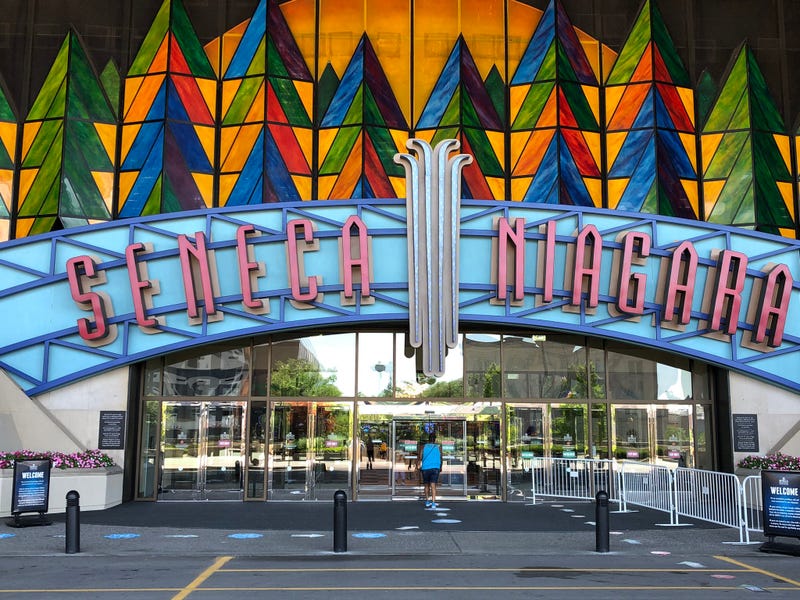
Buffalo, N.Y. (WBEN) - It was announced on Tuesday the Seneca Nation Council approved a resolution with New York State referring to the Nation’s outstanding gaming compact dispute. The resolution from the Council calls for the transfer of $564,842,625.20 from an account in which compact-related funds have been held.
The amount transferred covers a five-year period spanning Jan. 1, 2017 through Dec. 31, 2021, representing a 25% share of slot machine revenues from the Nation's casinos in Buffalo, Niagara Falls and Salamanca.

With the money now being transferred to the State, it will allow for the lifting of restrictions placed on several bank accounts held by the Seneca Nation and its businesses. This comes after a subpoena was issued by New York State, which targeted and froze the Nation's bank accounts until the debt was paid.
Seneca Nation President Matthew Pagels believes New York Gov. Kathy Hochul and her administration blatantly acted out of aggression to secure the funds owed to them.
"Our counselors and executives agreed that the Seneca Nation simply could not stand by while New York State intentionally attempted economic coercion on holding Seneca people and thousands of Western New Yorkers hostage," said Pagels in a statement via the Seneca's Media and Communications Center YouTube account. "The state may think it's appropriate to force an elder to go without diabetes medication, or a family already dealing with the financial impacts of the pandemic to go without a paycheck. Our nation will not let that happen. We will not let New York State strangle Senecas and the people of Western New York."
While the money is being transferred by the Seneca Nation, President Pagels also had another message for New York State.
"Don't use the people of Western New York as pawns in your obvious desire to destroy the Seneca Nation. You have an obligation under federal law to negotiate a compact with the Seneca Nation in good faith. Honor it," he said vehemently. "The Seneca Nation is demanding fairness in our gaming compact, fairness from New York State, fairness from the federal government that is supposed to look out for the interests of Native nations. We have received neither of those in the past two decades.
"After 20 years, our compact must finally recognize the true condition of the gaming landscape. Not New York's empty promise on fictional benefits. If the Indian Gaming Regulatory Act is to be believed, then the federal government must hold our compact to the standard of ensuring that the Seneca Nation, and Senecas are the primary beneficiaries of our gaming enterprise, so that our business supports our peoples and our nation's economic growth first and foremost. The Seneca Nation will not rest until we have a compact in place that secures the future of our gaming business in Western New York, for our Seneca people, for our thousands of dedicated employees, for our business partners, and for our neighbors. We're not going anywhere, and we will not tolerate a Governor and a state hell bent on crushing us."
The current compact between the Seneca Nation and New York State expires in December of 2023.
Gov. Hochul's office issued a statement following the Seneca Nation's announcement Tuesday evening, saying her administration has been committed to resolving this dispute with the Senecas and securing the funds owed to the State and other local governments.
"The courts have consistently ruled in the State's favor, yet no payments were made," said Hochul in her statement. "Upon taking office, I sought to negotiate in good faith, and we have met every hurdle. I am pleased to have finally reached a resolution, and the full $564 million has been received by New York.
In addition, she adds that more than $418 million will be directed towards the State's share to construct the new Buffalo Bills stadium in Orchard Park.
"This will ensure the Bills remain in New York State and support 10,000 construction jobs," Hochul said further. "The remainder of the funds will go directly to the counties and cities of Western New York and be re-invested to support the local economy and communities.
"I thank President Pagels and the Nation leadership for fulfilling their commitment to the people of New York."
Upon reading Gov. Hochul's statement, Pagels did not react well, issuing a separate statement via YouTube on Wednesday with some harsh comments for the Hochul Administration.
"Gov. Kathy Hochul gladly declared that the state would use hundreds of millions of dollars for a new state-owned football stadium, all with no concern to needs from across the state from wages and roads, and so much more. In one breath, New York's hostile and shameless greed was laid for the world to see," Pagels said on Wednesday. "Hundreds of millions of dollars from Western New York, in her own words, given to billionaires after intentionally and unnecessarily holding the Senecas and thousands of Western New Yorkers and families hostage for several days by strangling various bank accounts held by the nation and our businesses. Gov. Hochul couldn't contain her excitement to boast about her Seneca ransom money for a new stadium."
Pagels went on to add that the Governor's announcement Tuesday evening is just the latest chapter of the State's long history of mistreating and taking advantage of native people.
"Gov. Hochul happily tried to strangle Western New York and squeeze every penny she could get from the Seneca Nation. It's not surprising to us that the Governor thinks her actions should be applauded as progress. That's the Albany way," he said. "The claims that a new day has dawned in Albany have turned into a stinking Groundhog's Day, just more of the same as it's always been. The Governor's new stadium won't be a product of progress. It'll be a monument to Albany's vindictive desire to punish the Seneca people. Ultimately, it's something we're all too familiar with."
Given the actions the Hochul Administration used to freeze Seneca bank accounts, how is something like that legal?
"Well, the state considers itself to be a debtor, so what's happened is that it's been available for them to be able to freeze assets. They're the regulator for the bank," said Director of the Financial Services Lab at Niagara University, Ed Hutton. "It's been a long-standing feature in banking that if someone owes you money and you can prove that they owe you money, you can hold up their bank account so that they can't take the money out that they consider is rightfully owed to you. That, apparently, is what New York State has been using as the justification for freezing the assets of the Senecas. They consider that money was owed to them, that they've already been to court several times, and they felt this was money that was legally owed to them, and they were taking the steps to recover it."
With the State going with the approach to freeze the Nation's bank accounts, Hutton believes it was a very heavy-handed move on the State's part.
"That meant that all of the checks that had been written by the Seneca Nation, no matter what it was for, those basically couldn't have been cashed," Hutton said. "There was an amount in dispute, yes, I understand that, but then there was a maneuver by the State to freeze all of the money in the account. And I think that was a very heavy-handed approach."
With all that has transpired between the Seneca Nation and New York State, is it possible for a government entity to do the same thing to anyone in the public? As Hutton explains, if one person owes another any sum of money, there is a legal process in which their bank accounts can be frozen.
"In any situation where you owe a debt and it's been through a court process, if you don't pay back the debt and you've exhausted all your remedies in court, there's always been that ability for the person that you owe the money to, to ask to have your accounts frozen, to reclaim that money. It's through real estate or through bank accounts, that sort of thing," he said. "It's a very indelicate maneuver that the state used, but I think it's something that's been around for a long time. Having said that, it's I think a very, very difficult situation, especially what it did for the people in the Seneca Nation, who needed to cash checks."
Hear more of Hutton's reaction to the State's freezing of Seneca Nation bank accounts in the player below:

